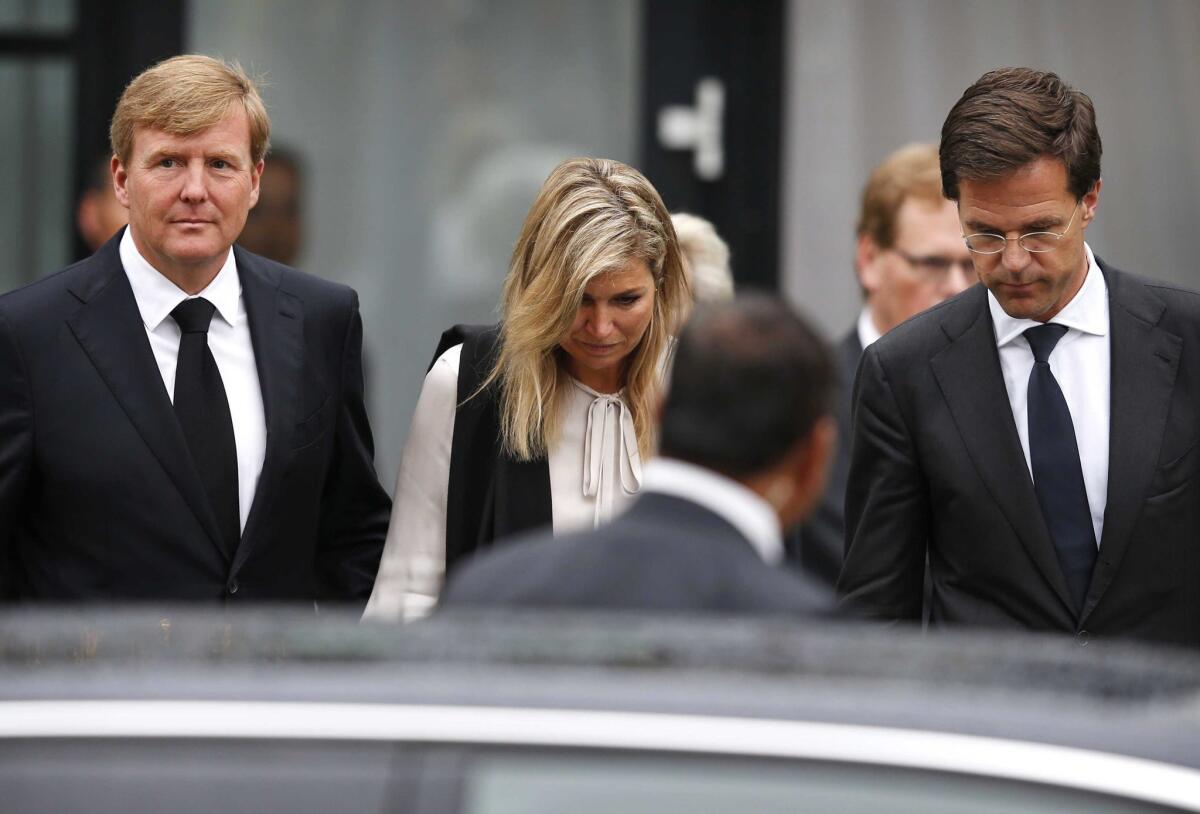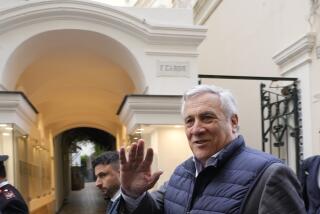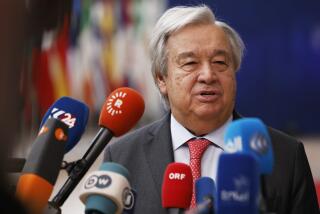Britain’s Cameron warns of additional penalties on Russia after crash

- Share via
Reporting from London — British Prime Minister David Cameron said Monday that he would press fellow European leaders to impose harsher sanctions on Russia in the aftermath of the Malaysia Airlines crash.
Cameron, who has been the most vocal Western European leader to advocate stiffer penalties against Moscow, said that he, German Chancellor Angela Merkel and French President Francois Hollande agreed “that we should push our partners in the European Union to consider a new range of hard-hitting economic sanctions against Russia.”
Cameron suggested slapping financial freezes and travel restrictions on the “cronies and oligarchs” around Russian President Vladimir Putin, even if they have no direct connection to the crisis in Ukraine. He told British lawmakers that the European Union should graduate to the third and strongest phase of its three-tier approach to sanctions against Moscow, going after entire sectors of the Russian economy rather than individuals.
He said there has been discussion of targeting airlines and banks connected to Crimea, the Ukrainian region annexed by Russia in March, as well as an embargo on arms sales or sales of so-called dual-use technologies that can have civilian and military applications.
European foreign ministers are scheduled to meet Tuesday to discuss the EU’s next step. The 28 member states have been divided over their collective response to Russia since it seized Crimea. Nations such as Italy and Germany, which have deep political and commercial ties with Russia, have balked at heavier sanctions while other countries, such as Britain and Central and Eastern European nations, have urged stronger action.
With their economies still fragile, many European countries have hesitated to take steps against Moscow that would adversely affect their trade with Russia or that might jeopardize the Russian gas and oil supplies on which some of them depend. For example, critics have called on France, whose economy is stagnant, to scrap a $1.6-billion deal to supply Russia with two advanced warships.
The large majority of those killed aboard Malaysia Airlines Flight 17 were Europeans, with about two-thirds of the 298 victims from the Netherlands. If the Dutch were to join the push for greater sanctions, it would be hard for other EU countries to ignore.
Dutch Prime Minister Mark Rutte said Monday he had made it “crystal clear” to Putin that responsibility lay with Russia to enable full access to the crash site by exerting its influence on the pro-Russia separatists controlling the area.
“If, in the coming days, access to the disaster area remains insufficient, all political, economic and financial options are on the table against those who are directly or indirectly responsible for this,” said Rutte, who joined King Willem-Alexander and Queen Maxima on Monday afternoon for a closed-door meeting with relatives of the victims near the Dutch city of Utrecht.
With evidence mounting that pro-Russia separatists fired the missile that brought down the jetliner, Cameron and others argue that Europe needs to put principles before profits.
“For too long, there has been a reluctance on the part of too many European countries to face up to the implications of what is happening in eastern Ukraine,” Cameron told the House of Commons. “It is time to make our power, influence and resources felt.”
Declaring the conflict that led to the downing of Flight 17 was fed by “Russia’s attempt to destabilize a sovereign state, violate its territorial integrity and arm and train thuggish militias,” Cameron said “Europe and the West must fundamentally change our approach to Russia” if Moscow persisted in its course.
“Russia cannot expect to continue enjoying access to European markets, European capital, European knowledge and technical expertise while she fuels conflict in one of Europe’s neighbors,” he said.
Follow news in Europe: @HenryHChu
More to Read
Sign up for Essential California
The most important California stories and recommendations in your inbox every morning.
You may occasionally receive promotional content from the Los Angeles Times.











